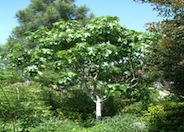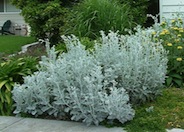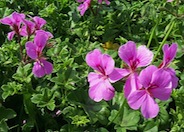
Common name:Muskogee Crape Myrtle
Botanical name:Lagerstroemia 'Muskogee'
This Crape Myrtle hybrid is a popular tree which grows to 25' tall and 12' wide. It blooms with lavender flowers in the summer; leaves turn red in fall. It is mildew resistant and does well in areas with hot summers. Crape Myrtles bloom on new wood so prune in winter or early spring to increase flowering. - Carolyn Shaffer, Dudek and Associates

Common name:Fig Edible
Botanical name:Ficus carica
This small tree produces wonderful figs that are a brownish red color.

Common name:Hybrid Tea Rose (selections)
Botanical name:Rosa Hybrid Tea varieties
These shrubs and vines are the most loved in the Western USA and are very resilient. They come in a wide variety of sizes and colors and are easy to maintain with proper care. They can be used in a water-conserving garden with careful attention to irrigation practices.

Common name:Dusty Miller, Silver Groundsel
Botanical name:Senecio cineraria
The Dusty Miller exhibits growth to 1' or more, with velvet gray leaves that have broad, roundish lobes. Yellow flower heads appear through the middle of the plant during most months of the year. Cut heads back occasionally to encourage bushiness.

Common name:Ivy Geranium
Botanical name:Pelargonium peltatum
Clouds of single or double flowers are produced from spring through fall on this plant, which should be planted in areas that receive afternoon shade in warm inland valleys. Foliage resembles ivy (pointed lobes) and are bright green and glossy. Ivy Geranium looks great in hanging baskets, window boxes or in planters. Do not use for erosion control.

Common name:Sea Lavender, Statice
Botanical name:Limonium perezii
This mounding shrub will reach about 3' high and has large, dark green leaves with small blue and purple flowers that bloom in spring and summer.
| Designer: Nan Simonsen Nanscapes | Step Away from Pink Delights |
Photographer: GardenSoft |
Soils and Compost:
Maintain a two to four inch layer of mulch on the soil surface to reduce weeds, infiltrate rain water, and reduce compaction.
Integrated Pest Management:
Develop healthy soil for plants that are vigorous and naturally pest-resistant.

